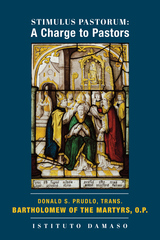3 books by Prudlo, Donald S.

Governing Perfection
Donald S. Prudlo
St. Augustine's Press, 2023
"In the beginning, God administrated." For as Donald Prudlo observes, "There can be no achievement without administration." In this book he seeks to restore the idea that while administration is necessary even in the institutional Church, holiness is not only possible for those charged with governance, but is a fulfillment and type of Christus Rector omnium, or "Christ, Ruler of all.
Scrutinizing the relevant thought of Aristotle, Machiavelli, Thomas Aquinas, and Nietzsche, among others, Prudlo pursues the notion of order in governance and confronts both the bloat of bureaucracy and the "intoxicating nature of power." How can men and women who strive to live out humility and holiness likewise establish and participate in the structures that wield the powers of governance? "For the followers of Christ does not such a combination seem doomed from the outset?" Prudlo advances a thorough investigation of saints of the Christian tradition, whose responses to the problems inherent in authority and administration are living examples of the reality of grace building upon nature.
Of particular interest is Prudlo's historical presentation of the concept of Romanitas, a style of governance inherited from ancient Rome. Four early popes are given close attention for their respective administrations: Damasus I, Leo I, Gelasius I, and Gregory I. Emphasis is also given to the specific administrative genius that emerges from the monastic orders, including the 'Pachomian solution' and the Benedictine Rule. Prudlo gives the reader a portrait of Leo IX's reinvigoration of the ancient practice of 'synodality,' and the centrality of the papacy to internal ecclesial reform. In the context of an inquiry into monastic and papal administrations, readers encounter the beginnings of the Roman Curia as well, and are confronted with the difficulty of inserting new forms of apostolic itinerant preaching into the institutional life of the Church.
This study is an important contribution to the history of the papacy, ecclesiology and its relevance to legal ordering, and administration within governance as affected by multiple legal and cultural traditions. It is a masterful presentation that provides both the framework and reflection needed to inspire true perfection the in administrative forum. The relevance and force of Prudlo's Governing Perfection makes it a choice follow-up to his recent translation of Bartholomew of the Martyr's classic, Stimulus Pastorum: A Charge to Pastors (2022).
Scrutinizing the relevant thought of Aristotle, Machiavelli, Thomas Aquinas, and Nietzsche, among others, Prudlo pursues the notion of order in governance and confronts both the bloat of bureaucracy and the "intoxicating nature of power." How can men and women who strive to live out humility and holiness likewise establish and participate in the structures that wield the powers of governance? "For the followers of Christ does not such a combination seem doomed from the outset?" Prudlo advances a thorough investigation of saints of the Christian tradition, whose responses to the problems inherent in authority and administration are living examples of the reality of grace building upon nature.
Of particular interest is Prudlo's historical presentation of the concept of Romanitas, a style of governance inherited from ancient Rome. Four early popes are given close attention for their respective administrations: Damasus I, Leo I, Gelasius I, and Gregory I. Emphasis is also given to the specific administrative genius that emerges from the monastic orders, including the 'Pachomian solution' and the Benedictine Rule. Prudlo gives the reader a portrait of Leo IX's reinvigoration of the ancient practice of 'synodality,' and the centrality of the papacy to internal ecclesial reform. In the context of an inquiry into monastic and papal administrations, readers encounter the beginnings of the Roman Curia as well, and are confronted with the difficulty of inserting new forms of apostolic itinerant preaching into the institutional life of the Church.
This study is an important contribution to the history of the papacy, ecclesiology and its relevance to legal ordering, and administration within governance as affected by multiple legal and cultural traditions. It is a masterful presentation that provides both the framework and reflection needed to inspire true perfection the in administrative forum. The relevance and force of Prudlo's Governing Perfection makes it a choice follow-up to his recent translation of Bartholomew of the Martyr's classic, Stimulus Pastorum: A Charge to Pastors (2022).
[more]

Merchant Saint
The Church, the Market, and the First Lay Canonization
prudlo
St. Augustine's Press, 2024
Paul Voss and Donald Prudlo trace Western attitudes to money, merchants, and the market through 3,000 years of history. They focus their attention on one person in particular, Omobono of Cremona (1117–1197), as an axial figure in the wholesale reappraisal of the value of business, entrepreneurship, and white-collar work in Christian Europe. More precisely, Voss and Prudlo examine the evolution of the mentality of wealth and economics in the Catholic Church, beginning from the Scriptural disdain for material pursuits and moving to the eventually declared sainthood of Omobono, a lay merchant living amid the hectic rhythm of a life of business. As the authors note, "His story resonates today with an unexpected poignancy for the contribution it makes to the pressing issues of economic justice, free markets, work-life balance, the 'theology of work,' and Catholic history." The reconstruction of the socio-theological perspective of wealth is a fascinating contribution to contemporary attempts to reconcile culture, capitalism, and the common good. Omobono stands as the first lay individual proposed by the Catholic Church as a model of heroic virtue, and thought him commercial life came thereby also to be 'canonized' as a possible path to sanctity.
Voss and Prudlo provide a rich resource for readers concerned with the proper aims and boundaries of a life in the world of commerce, the nature of work, the ethics of profit, the problem of money-lending, the virtues needed for moral capitalism, and the tension between otium and negotium. Voss and Prudlo have accumulated a veritable trove of primary text materials relating to the life of Omobono, and provide translations and commentary to complete their analysis. This fascinating account crosses the threshold of pure history and stimulates inquiry in the fields of philosophy, economics, and theology.
Voss and Prudlo provide a rich resource for readers concerned with the proper aims and boundaries of a life in the world of commerce, the nature of work, the ethics of profit, the problem of money-lending, the virtues needed for moral capitalism, and the tension between otium and negotium. Voss and Prudlo have accumulated a veritable trove of primary text materials relating to the life of Omobono, and provide translations and commentary to complete their analysis. This fascinating account crosses the threshold of pure history and stimulates inquiry in the fields of philosophy, economics, and theology.
[more]

Stimulus Pastorum
A Charge to Pastors
Bartholomew of the Martyrs, O.P.
St. Augustine's Press, 2022
The work of St. Bartholomew of Braga, O.P. (1514–1590) appears here in English for the first time despite its long and enduring influence in ecclesiastical circles. His meditations on the office of pastor have provided critical insight bishops since their initial circulation and have helped form the most famous among them, including Bartholomew's proteges Charles Borromeo. Pope Paul VI ordered a copy of Bartholomew's work to be distributed among the Catholic bishops at the Second Vatican Council. Donald Prudlo's translation situates St. Bartholomew of the Martyrs in his historical context as a lynchpin of Catholic Reform and affirms him as a figurehead of pastoral administration even in our own times.
[more]
READERS
Browse our collection.
PUBLISHERS
See BiblioVault's publisher services.
STUDENT SERVICES
Files for college accessibility offices.
UChicago Accessibility Resources
home | accessibility | search | about | contact us
BiblioVault ® 2001 - 2024
The University of Chicago Press









